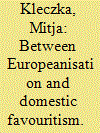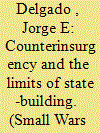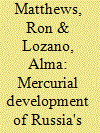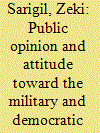| Srl | Item |
| 1 |
ID:
177044


|
|
|
|
|
| Summary/Abstract |
Germany’s export-oriented defence industry, like most other “large” European producers, aims to maintain its “key” capabilities whilst the scope for national approaches narrows further. Given the rising economic and security challenges, it appears likely that Europeanisation will gradually proceed.
|
|
|
|
|
|
|
|
|
|
|
|
|
|
|
|
| 2 |
ID:
138482


|
|
|
|
|
| Summary/Abstract |
The impact of the Ukrainian crisis on the structure of international relations as well as accelerated Russia's turn toward Asia as one of its widely discussed consequences can be hardly overestimated. Reorientation, very much within the concept of the multipolar world, began long before the crisis: Russia was seeking wider cooperation with the APR countries as the future center of world politics and economy; wider investments and high technologies of the most developed countries to whip up the economies of Russia's Asian regions and diversify political and economic cooperation so that to reduce its dependence on the West. Before the clashes in Ukraine, the leading Russian politicians were unanimous in their conviction that closer cooperation with Asia would complement rather than weaken Russia's partner relationships with the U.S. and the EU. Amid the Ukrainian developments the West is cutting down its cooperation with Moscow to force it retreat from its positions; this has woken up the Russian elite to a simple thought that there is no alternative to intensified cooperation with Asia.
|
|
|
|
|
|
|
|
|
|
|
|
|
|
|
|
| 3 |
ID:
139113


|
|
|
|
|
| Summary/Abstract |
Since 2002 the Colombian government has been implementing a series of policy initiatives that have sought to coordinate state resources in a neo-classical counterinsurgency approach to fight the country's main insurgent group, the Fuerzas Armadas Revolucionarias de Colombia (FARC), and recover and consolidate the territory. Despite impressive operational successes against the insurgency and other illegal groups, the government has been unable to reassert its control and build legitimacy via the state-building effort known as ‘Consolidación’, in some of the most recalcitrant areas of the country. This article examines two areas where government efforts at consolidation appear to be failing to discuss the limits of COIN theory and practice.
|
|
|
|
|
|
|
|
|
|
|
|
|
|
|
|
| 4 |
ID:
106717


|
|
|
|
|
| Publication |
2011.
|
| Summary/Abstract |
This article explores the significance of the ninth parliamentary election, held in December 2008, for democratic consolidation in Bangladesh. Three factors have made the ninth election important: first, it was held after two years of military-backed civilian caretaker rule when the government had adopted several measures for electoral and political reforms; second, the main parties formed pre-election alliances to face each other, rather than contesting the election on an individual basis, as was the practice in the past; and third, the composition of the electorate changed significantly, with nearly one-third of the voters casting votes for the first time. The use of a foolproof electoral roll also made the election results credible. Unlike the past, no major case of election rigging has been reported to the Election Commission after the elections. Nor did those losing the elections reject the results outright. The government also initially adopted a policy of inclusion, creating some space for the opposition to be proactive, and the opposition reciprocated by attending the inaugural session of the ninth parliament and pledging to make the parliament effective. The article explores the significance of this change in attitude as well as different electoral reforms for democratic consolidation in the country.
|
|
|
|
|
|
|
|
|
|
|
|
|
|
|
|
| 5 |
ID:
113113


|
|
|
|
|
| Publication |
2012.
|
| Summary/Abstract |
Russia's 2006 renationalisation of its aerospace industry heralded a new era in industrial policy. Symbolising a return to the importance of securing sovereignty over the Federation's strategic assets, it also posits, powerfully, that sectors like aerospace and shipbuilding are too important to be left to the market. In what now appears a reversal of this policy approach, Moscow is promoting partial privatisation and encouraging partnership with Western aerospace companies. Foreign infusion of capital and technology is viewed as the catalyst for Russian dominance in the global military and commercial aerospace industries.
|
|
|
|
|
|
|
|
|
|
|
|
|
|
|
|
| 6 |
ID:
138759


|
|
|
|
|
| Summary/Abstract |
The political influence of the Turkish military has substantially declined in the last decade, triggered by the European Union’s decision during the Helsinki Summit in 1999 to grant candidacy status to Turkey. This study illuminates Turkey’s democratization process in the post-Helsinki period by empirically analyzing a relatively underinvestigated aspect of civil–military relations: public opinion and attitude toward the military and civil–military issues. Empirical analyses, based on original and comprehensive public opinion data, indicate that despite impressive reforms and improvements in the legal and institutional structures in Turkish civil–military relations in the past ten years, democratic transformation in the political culture has been lagging behind. This gap is likely to complicate democratization process in Turkey. The article also provides a discussion of broader theoretical and practical implications of empirical findings.
|
|
|
|
|
|
|
|
|
|
|
|
|
|
|
|
| 7 |
ID:
081194


|
|
|
|
|
| Publication |
2008.
|
| Summary/Abstract |
Democratization scholars argue that Turkey has successfully transitioned to democracy and is consolidating liberal democracy. The political elite and the parties are deemed important factors in crafting democracies. However, the Turkish political leadership has not changed much until recently; therefore, it remains a puzzle why consolidation is taking place. There are two explanations: (1) there is no consolidation of democracy (2) a factor other than the turnover in political elite/change in the political system has led to consolidation. I argue that consolidation is in progress because of the lengthy but persistent transformation of the military in Turkey. I examine previously overlooked changes in Turkish military with respect to its structure and its relations to the society. I find that the change in the military contributes to the consolidation of democracy in Turkey, and other transitional democracies. As with any other institutional change, this process is slow and risky.
|
|
|
|
|
|
|
|
|
|
|
|
|
|
|
|